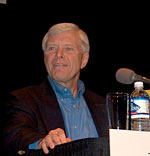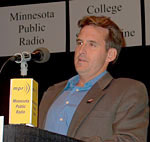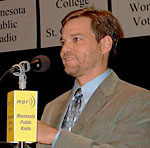By Michael Khoo
Minnesota Public Radio
September 13, 2002
The tone of this year's gubernatorial debate appears to be sharpening. The four major-party endorsees met Thursday night at a forum sponsored by Minnesota Public Radio and the League of Women Voters. The debate comes just two days after each candidate easily overcame a primary challenge. And now, each is drawing clearer distinctions between himself and his opponents.
| |
|
|
|
||
With school districts turning to local property taxpayers in record number for additional funding, Senate Majority Leader and DFL gubernatorial nominee Roger Moe has staked his campaign on investing in education.
But it was Independence Party candidate and former congressman Tim Penny who seems to have jumped out front on the issue. Penny says school districts, like cities and counties, should, within unspecified limits, be allowed to increase local taxes without direct voter approval.
"I would prefer that there be greater discretion for the local school board to raise some of these operating revenues without a referendum vote and to be held accountable by their district voters for their decision and for the results that that extra funding helps achieve," Penny said.
Penny says if school board members overstep their mandates, voters can voice their displeasure at the next board elections. Penny also set himself apart from his opponents by underlining his refusal to accept funding from special interest groups and political action committees.
| |
|
|
|
||
His remarks came as a veiled jab at opponents Moe and GOP candidate Tim Pawlenty. Moe, however, was more direct. He questioned Penny's participation in a Cato Institute budget proposal that calls for the elimination of a host of federal programs, including the Direct Student Loan Program and Federal Crop Insurance.
Penny has distanced himself from those proposals, saying he assisted in the production of the report but doesn't agree completey with Cato's priorities. Moe also pointed to the records of Penny and Pawlenty when discussing pharmaceutical prices.
"I wouldn't vote against the Fair Prescription Drug Pricing Act like Tim Pawlenty did or lobby against it like Tim Penny did. I would make sure that we have a Fair Prescription Drug Pricing Act in this state. I've passed it in the Senate. And I'll sign it if I'm governor," said Moe.
The bill in question was modeled on a system in Maine and would have required pharmaceutical companies to provide discounted prices to eligible Minnesotans.
| |
|
|
|
||
Penny says, although he may have spoken against the legislation, he never actually lobbied for its demise. Pawlenty sought to distinguish himself as the only candidate who's pledged not to raise taxes. In a question to Moe, Pawlenty doubted the ability of either Moe or Penny to hold the line on government spending.
"You served with Tim Penny in the Legislature. I think you helped lead, as Senate Majority Leader, one of the state's largest tax increases and other tax increases as well. And Tim Penny was the deciding vote in the United State Congress for the largest tax increases in the nation's history," Pawlenty said.
Green Party candidate Ken Pentel was largely spared from the finger-pointing. But that didn't stop him from questioning the others' commitments to the environment.
Pentel has made ecological stewardship a hallmark in his campaign. And he expressed skepticism when he heard his three opponents pledge to protect Minnesota's lakes, streams, and habitat.
| |
|
|
|
||
"It just intrigues me to hear the representative and the senator and the congressman talk about how it's important to take care of the state's resources. I've been going to the Capitol; I've been writing letters; I get called an ultra-extremist when I go to the Capitol and say, 'We're no longer going to damage this state's resources.' I mean, who's been watching the store?" Pentel said.
Pentel says he'll push for tax incentives to encourage local, organic farm production, and he says he'd like to see a moratorium on farm foreclosures.
The debate was the second in one day. And the pace is likely to continue through November.
More from MPR



